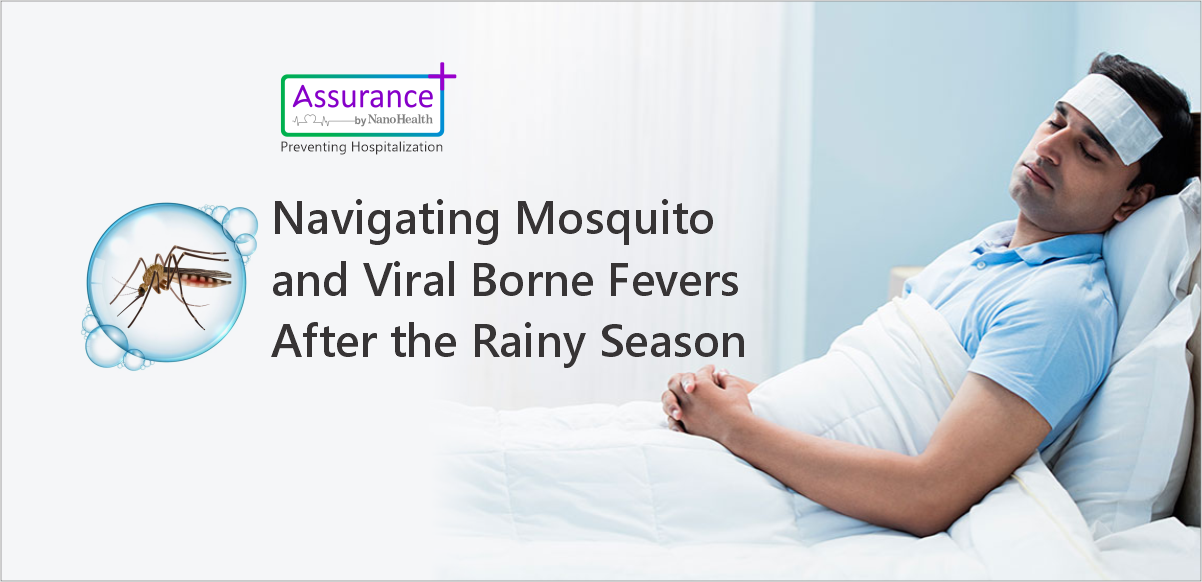

Navigating Mosquito and Viral Borne Fevers After the Rainy Season
As we transition from the rainy season, a period that often brings relief from the scorching heat, we find ourselves facing a new set of health challenges. The humid post-monsoon environment creates a fertile breeding ground for various illnesses, and fever remains a common concern during this time.
Let's delve into the distinct causes of fever and the tell tale signs that can help us differentiate between them.
Viral Infections
The post-monsoon season sets the stage for an uptick in viral infections. The combination of people spending more time indoors due to wet weather and the high humidity fosters a favorable environment for viruses to spread. Close proximity among individuals facilitates the transmission of viruses that lead to fever, coughing, sneezing, and respiratory distress. These infections are often characterized by an abrupt onset of symptoms, and while they can be uncomfortable, they tend to resolve on their own, with adequate rest and supportive care.
Mosquito-Borne Illnesses (Malaria and Dengue)
The dampness left behind by the monsoon rains becomes a breeding ground for mosquitoes, which are vectors for diseases like malaria and dengue. These illnesses are marked by high fever accompanied by chills and severe body aches. It's important to note that both malaria and dengue are serious conditions that require prompt medical attention. Malaria typically presents with recurrent fevers, while dengue fever often brings intense joint pain and a distinctive rash. Early diagnosis and proper medical intervention are essential to managing these conditions effectively.
Waterborne Diseases (Typhoid)
Stagnant water due to waterlogging provides an ideal setting for the proliferation of bacteria like Salmonella, the culprit behind typhoid fever. Typhoid presents with high fever, weakness, and abdominal discomfort. Unlike viral infections, typhoid tends to linger and can lead to severe complications if left untreated. Accurate diagnosis and appropriate antibiotics are crucial in combating typhoid.
Recognizing Potential Serious Signs
While most fever cases are mild and can be managed at home, specific red flags warrant immediate medical attention. These include:
-
High and Persistent Fever: Fever above 104°F or lasting more than a couple of days requires medical help.
-
Severe Headache: Intense and unresponsive headaches should not be ignored.
-
Difficulty Breathing: Breathlessness indicates a need to consult a doctor.
-
Persistent Vomiting and Diarrhea: Severe and prolonged symptoms necessitate medical attention,especially in children.
-
Red/brown vomitus or blackish stools
-
Staying Informed and Seeking Help
Differentiating between these fever-causing factors is vital, as it dictates the course of action needed for recovery. Paying attention to the specifics of your symptoms and any recent exposure to potential sources of infection can provide important clues. If you experience symptoms that align with mosquito-borne illnesses, waterborne diseases, or viral infections, seeking medical guidance from healthcare professionals like those at Assurance by NanoHealth is a wise step.
Remember, accurate diagnosis ensures appropriate treatment, promoting a faster recovery and preventing potential complications.
Self-Care Measures
Prevention is the first line of defense. To minimize the risk of mosquito and viral borne fevers, consider the following self-care measures:
-
Staying Hydrated: Drink ample clean water to stay hydrated and flush out toxins.
-
Personal Hygiene: Maintain regular handwashing, especially before eating and after using toilet , clipping nails etc to maintain overall cleanliness.
-
Safe Food Consumption: Opt for freshly cooked meals and avoid raw or street food.
-
Protective Clothing: Wear suitable,[ long sleeved ]clothing to prevent mosquito bites.
-
Rest and Recovery: If illness strikes, prioritize rest for recovery. Sufficient sleep,adequate nutrition empowers your body to combat infections.
Over-the-Counter Medications
Over-the-counter (OTC) medications can help manage fever symptoms, but it's essential to use them wisely. Follow these guidelines:
Read Lab
els: Carefully read and follow the instructions on OTC medication labels.
Appropriate Dosage: Stick to the recommended dosage and do not exceed it.
Consult a Pharmacist: If you're unsure about which medication to take, ask a pharmacist for advice.
Avoid Self-Medication: While OTC medications can provide relief, they may not be suitable for everyone. Consult a doctor if your symptoms worsen.
Assurance by NanoHealth: Your Trusted Healthcare Provider
Assurance by NanoHealth is committed to providing you with comprehensive support for your health concerns. Whether you need immediate advice, want to explore health information on our website, or require testing and diagnosis, our dedicated team of medical professionals is here to assist you every step of the way. Your health matters, and we're here to ensure you receive the care you need.
Book your consultation now and embark on a journey towards a healthier, happier you! Call +91 9100444004 number or reach to us on our website www.nhassurance.com
Also, if you're worried about Dengue fever, then stay cool, 'cuz we've got the tool! Introducing Our Expertly Crafted Dengue Monitoring Program!
Our state-of-the-art Dengue Monitoring Program, meticulously designed by experts, is your ultimate shield against hospital
ization.
Here is what it includes:
-Comprehensive Support: Enjoy access to top doctors, lab tests, nutrition experts, and health coaches, all included!
-Regular Blood Checks: Keep tabs on your health effortlessly.
-Health Coaches on Speed Dial: Get instant support whenever you need.
-Real-time Updates: Monitor your progress with twice-daily check-ins.
Stay Home, Stay Safe! Prevent Dengue, stay out of the hospital. Launching next week - Get ready to take control of your health like never before!
Got any doubts about dengue? Make sure to watch our YouTube video on dengue prevention & management!
